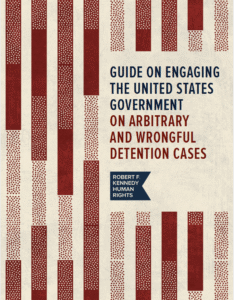(March 22, 2016 | Washington, D.C.) Robert F. Kennedy Human Rights condemns the Egyptian government’s escalating attempts to silence the country’s civil society, as the government moves to reopen Case No. 173/2011, popularly known as the “foreign funding case.” The first phase of the case resulted in 43 staff of international non-governmental organizations (NGOs) being sentenced to prison for one to five years in 2013 on charges of operating unlawfully in the country and receiving foreign funding without permission. According to Egyptian sources, the government is now pursuing a second phase of the case and is beginning to investigate at least 37 additional Egyptian NGOs – including some of the most prominent human rights groups in the country.
On March 13-14, two staff members of the Cairo Institute for Human Rights Studies (CIHRS) and three staff members of Nazra for Feminist Studies were notified by telephone of a summons to appear before an investigating judge in the case. On March 17, the Cairo Criminal Court announced that it was hearing a case regarding the freezing of assets of four individuals and their families, including founder of the Egyptian Initiative for Personal Rights (EIPR), Hossam Bahgat, and director of the Arab Network for Human Rights Information (ANHRI), Gamal Eid. On March 21, the investigative judge issued a media gag order, barring media from reporting on the case.
These recent developments occur within a broader trend of increasing government crackdown on Egyptian civil society. On March 3 and after submitting a draft torture bill to the Presidency, lawyer Negad El-Borai learned that he faced six charges, including running an unlicensed organization and disturbing public order. On February 29, CEO of the Egyptian Democratic Academy, Hossam El-Din Ali, was stopped at the airport and informed that he was barred from travel to the United States. Other human rights defenders have also faced travel bans without notice and without cause in recent months. On February 17, in the wake of issuing a report on torture perpetrated by security forces, NGO and torture rehabilitation clinic, El-Nadeem, was served with an administrative closure order.
Many of the measures taken by the Egyptian government occur under the guise of the country’s repressive NGO Law (Law No. 84 of 2002) and Penal Code amendment (Presidential Decree No. 128 of 2014) that broadly criminalizes the receipt of foreign funding. United Nations Special Rapporteur on the rights to freedom of peaceful assembly and of association, Maina Kiai, has previously stated that the NGO law “places additional burdens on associations that risk undermining legitimate human rights activities.” The actions of the government violate Egypt’s domestic and international legal obligations to respect the rights to freedom of association, expression, and movement under the Egyptian Constitution, the International Covenant on Civil and Political Rights, and the African Charter on Human and Peoples’ Rights.
Egypt’s crackdown on civil society raises additional serious concerns in light of continued violations to the fundamental rights of Egyptians. In the last year there has been ongoing reports of forced disappearances like the case of Italian student Giulio Regeni, the sentencing of writers like Ahmed Naji for manifestations of creative expression, and the continued punitive use of pretrial detention, even beyond the domestic two-year maximum, to punish journalists, peaceful political dissidents, and everyday activists including Robert F. Kennedy Human Rights client Mahmoud Hussein – arbitrarily arrested, tortured, and held in illegal pretrial detention for over two years for wearing an anti-torture t-shirt.




